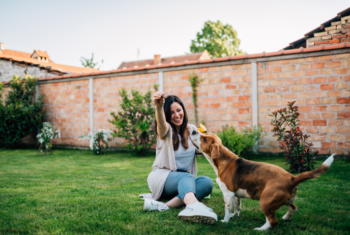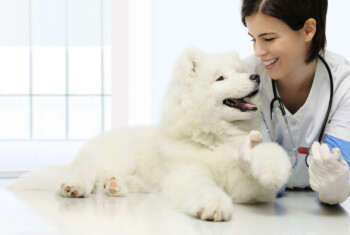Expert tips to keep pets safe this holiday.
The holiday season is one of the busiest times of the year for veterinary emergency hospitals around the country. In fact, at BluePearl, we see an overall 69% increase in chocolate-related emergency visits every Christmas Eve.
With people busy spending time with family and friends, it is easy for unattended pets to get into hazardous holiday treats and items. Keep pets safe and avoid an unexpected trip to the veterinary emergency room this Christmas by following these expert tips from Lindsey E. Bullen, DVM, Diplomate ACVN, Board Certified Veterinary Nutritionist, BluePearl in Cary, NC.
Christmas trees.
Live Christmas trees produce tree oils, which when ingested, can be toxic to pets, causing mouth irritation, vomiting, excessive drooling, and diarrhea. Additionally, if the tree base water contains fertilizers or preservatives, depending on the concentration and content, this can potentially be dangerous for pets if ingested.
Real or fake, do not let pets chew or swallow fallen tree needles, as these are not digestible and are mildly toxic depending on the pet’s size and the number of needles ingested. Tree needles can cause issues to pets’ digestion by obstructing or puncturing their gastrointestinal tract.
Cover the base of the Christmas tree so the pet does not mistake it for a drinking bowl and clean up the needles as often as possible. If you think your pet has ingested tree water or tree needles, immediately contact a veterinarian or the Pet Poison Hotline.
Hazardous Christmas foods.
While we want our pets to enjoy the holidays with us, we must be cautious when giving our furry companions certain foods, as some can be unsafe. Candies, cookies, or pies containing grapes, coffee, chocolate (especially, chocolate-covered espresso beans), macadamia nuts, walnuts, or xylitol (a common sugar substitute used in hundreds of sugar-free candies and pastries) can be particularly dangerous if ingested by pets.
A small amount of cinnamon – such as that found in baked goods – is not likely to cause problems for your pet; however, other ingredients could be harmful. To reduce any risk of illness, avoid giving pets anything like “Santa’s” cookies or candy canes.
Safe foods for pets.
- Turkey meat. No skin, gravy, bones, or meat fat. Even in small doses, these foods can cause a life-threatening condition in pets called pancreatitis.
- Salmon. No seasoning, bones, and non-smoked.
- Lamb meat. No bones or fat.
- Scrambled egg(s)
- Green beans
- Brussel sprouts
- Parsnips
- Carrots
- Peas
- Potatoes
- Sweet potatoes
- Plain, low-fat yogurt (check the ingredient list to make sure xylitol is not listed)
Make sure all foods given to pets are prepared without garlic and/or onions, as these also pose potential dangers if ingested.
Homemade treats.
To include pets in the fun during family meals around the holidays, prepare some tasty, homemade treats. Choose a recipe with your pet’s favorite flavors, but be mindful of toxic ingredients that could cause a medical emergency. To look just like Christmas cookies, decorate treats using peanut butter (check the ingredient list for xylitol), yogurt, and shredded carrots.
Before feeding your pet any human foods, remember to always check with your veterinarian. Every pet is unique, so what may be okay for one pet may not be okay for another. Additionally, pets with chronic illnesses or diseases should stay on their prescribed diet (if they are on one) as any deviation could result in illness. Contact your local veterinarian or veterinary nutritionist for some holiday help if you have any questions or concerns.


